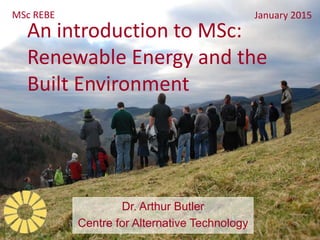Rebe open day
- 1. An introduction to MSc: Renewable Energy and the Built Environment MSc REBE January 2015 Dr. Arthur Butler Centre for Alternative Technology
- 2. REBE ď‚— A brief history of teaching and training at CAT ď‚— What is the course trying to achieve? ď‚— How do we do it? ď‚— Who does it? 2
- 3. CAT ď‚— CAT first opened to the public in 1975 ď‚— Has always worked in the wider environmental and social spheres ď‚— Principally CAT has been about practical action Specialities are ď‚— Low energy and sustainable buildings ď‚— Application of renewable energy systems ď‚— Water and sewage treatment 3
- 4. MSc REBE Programme ď‚— Theoretical and practical study in RE systems, the built environment and wider environmental context ď‚— Skills sought after in professional practice ď‚— Validated for full MSc status by the University of East London (UEL) ď‚— Accredited by the Energy Institute (can be used as evidence towards CEng professional status) ď‚— First cohort enrolled Sep 2007 4
- 5. (Department of Energy and Climate Change, 2012) 5
- 6. REBE-reasons to study ď‚— Advance individual careers ď‚— Add a theoretical background to an existing practical skills set ď‚— Add a practical background to a theoretical bias ď‚— Skill up students to be able to work in the renewable energy and building services industries ď‚— Undertake useful research which is applicable to the needs of the industry and society. ď‚— Some lectures from external academic & industry specialists-develop good network from immersive learning ď‚— Visit examples of building techniques and renewables onsite & in local area 6
- 7. REBE ď‚— Uses a systems approach ď‚— Is presented as a mixture of lectures, practicals seminars and tutorials. ď‚— Two forms of module: ď‚— Combined topic modules blend study of 2 related topics using traditional lecture based learning with smaller practicals to reinforce the theoretical results. ď‚— Single topic modules add extra depth or for some an additional practical base:- building, monitoring and analysing systems 7
- 8. REBE 2014/2015 ď‚— Study the core module & choose 3 others ď‚— (>1 Single Topic Module) 8
- 10. Module Outputs Combined topic module ď‚—Essay, report, presentation Single topic module ď‚—Group presentation, individual report Dissertation ď‚—During the first 3 modules the student agrees a dissertation subject with the REBE academic staff. ď‚—After completing the 4 modules required the student undertakes their own research producing a dissertation over a 6 month supervised dissertation module 10
- 11. The staff ď‚— Library services etc via UEL ď‚— Student support officer provides day to day support on non academic issues ď‚— Head of quality and support ď‚— Heads of education ď‚— Programme leaders ď‚— Tutors & lecturers ď‚— External lecturers 11
- 12. The academic staff on REBE ď‚—Staff have a variety of backgrounds and specialisms including: ď‚—Engineering ď‚—Renewable energy consultancy ď‚—Teaching qualifications/experience ď‚—Building physics/energy efficiency ď‚—Physics ď‚—Practical renewable energy design/specification/maintenance experience ď‚—PhD level research 12
- 14. MSc REBE: Key Strengths ď‚— Broad range of students in age and backgrounds (need degree level scientific and mathematical skills) ď‚— Staff include consultants and specialists ď‚— Leading professionals from industry to lecture and lead practical activities in specialist areas ď‚— Existing students praise the standard and combination of theoretical and practical activities ď‚— Unique learning environment ď‚— Detailed feedback and support ď‚— Novel and cutting edge dissertation research 14
- 15. Questions? MSc REBE January 2015 15 Centre for Alternative Technology
- 16. References Department of Energy and Climate Change (2012) Renewables Investment and Jobs Announced 1st April 2011 – 17th Jan 2012 Available at: http://www.decc.gov.uk/assets/decc/11/meeting-energy- demand/renewable-energy/3994-renewables-investment-and-jobs-announced-1-april-t.pdf (Accessed: 17th March 2012). 16
















